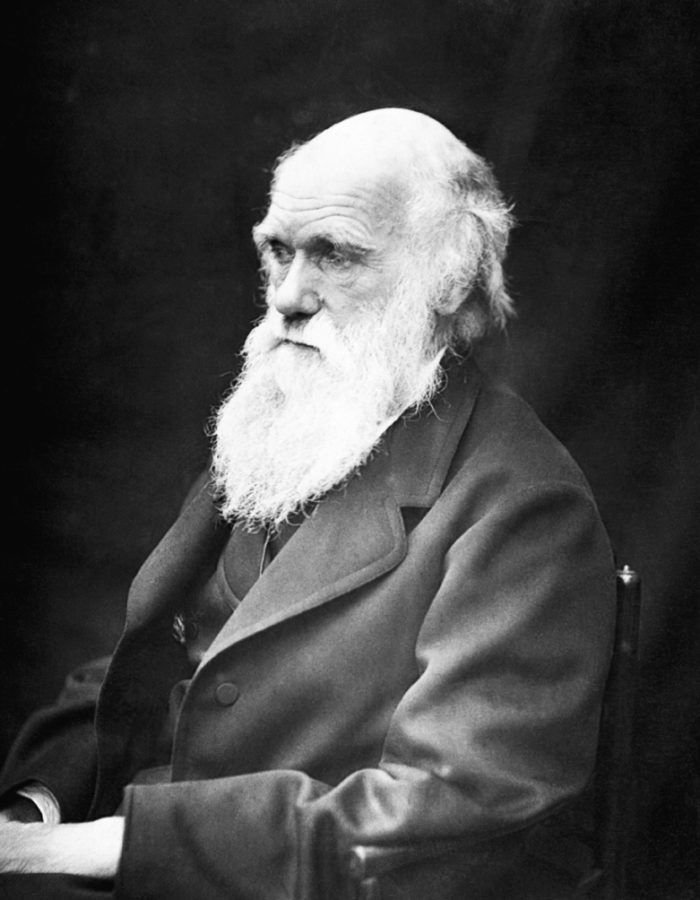Vriezen: Use Darwin Day to expand your mind
Courtesy photo: Wikimedia Commons
February 12, 2011, marks just more than 200 years since the birth of Charles Darwin.
February 9, 2011
February 12, 2011, marks just more than 200 years since the birth of a man who revolutionized our understanding of the natural world. This year is the 202nd birthday of Charles Darwin, whose work is now considered the most fundamental concept of biology.
The scientific community has made Darwin’s birthday into an occasion honoring scientific achievement and knowledge.
The International Darwin Day Foundation states, “Darwin Day is a global celebration of science and reason held on or around Feb. 12, the birthday anniversary of evolutionary biologist, Charles Darwin.”
The first public celebration of Darwin Day was sponsored by the Stanford Humanists and the Palo Alto Humanist Community in California in 1995.
Despite the fact intellectuals around the world will be throwing birthday parties, hosting events, lectures, discussions and debates to illuminate the impact evolution has on modern science, evolutionary theory and the workings of natural selection are concepts drastically misunderstood by the average American.
The Pew Research Center reports that 97 percent of scientists will agree humans and other organisms have evolved over time. In spite of overwhelming consensus among the most educated minds in our country, only 32 percent of the public will admit that life on Earth has evolved through natural processes and selection. Another third of the public rejects evolution outright, claiming humans and other animals have always existed in their present form, while 22 percent will say that evolution was a process guided by a supreme being.
It is almost pitiful, this lack of public acceptance about such an integral scientific concept. In comparing public acceptance of evolution among 32 European countries, the U.S. and Japan, only Turkey lags behind the U.S. in the acceptance of evolution. It truly baffles me how otherwise relatively intelligent people can blatantly refuse to acknowledge the scientific basis and evidence for evolution.
Just a few days ago, I was having a casual conversation with a classmate about the subjects covered in my Anthropology 202 course, one of which is human evolution. The young man stated his belief that fossils found of early humans or primate ancestors were either apes or humans, but not intermediates or hominin.
I can pull out my anthropology textbook and point to entire chapters dedicated to tracing our human roots back to earlier forms. There is abundant fossil evidence dating back millions of years of skeletons that are neither apes, nor man, but some distant relative of both in their evolutionary history — the fossils Ardi and Lucy, to name a few — not to mention the vast amount of genetic evidence from DNA sequencing, and a host of other supporting facts.
One question I am then faced with is, “What does this young man think he knows, that he can disagree with respected experts in an entire branch of science?” Please, share your evidence with the scientific community that shows the fossil record is completely misinterpreted.
To assume that one first-year college student has more insight into the fossil record that those that have dedicated their life to it seems presumptuous in the extreme. Just because the scientific support for evolution does not mesh with your personal belief doesn’t mean the evidence is wrong.
With that said, let’s take a look at some of the scientific advancements and discoveries we have made with our understanding of biological evolution — the change in genetic frequencies over time in populations.
What do we owe to Darwin and those that followed him? For one thing, we owe that lovely jab we get each flu season to the constantly evolving flu virus. Our knowledge of how viruses, bacteria, and other pathogens adapt to avoid our vaccines and antibiotics comes from understanding evolution.
This is also why agricultural pests seem to inevitably find a way around pesticides and sprays. Those corn borers that have a natural resistance to pesticides will live to reproduce, passing on their resistance to offspring. This ever-changing natural world demands that we adapt and change with it.
As much as I would like to go into an in-depth explanation of evolution, natural selection and their evidences, an opinion article is not the place to give a lecture on concepts that span textbooks. Nor could I do so as eloquently and clearly or as credibly as some of the great scientists of our time. However, I will recommend a few books for inquiring minds.
The book “Only a Theory: Evolution and the Battle for America’s Soul” by Kenneth R. Miller provides a thorough refutation of intelligent design, and a succinct explanation of evolution. I have also heard “Why Evolution is True” by Jerry A. Coyne is quite good, though I have yet to read it myself. For those of you that want a briefer version, there is always the Internet.
Despite the multitude of books on the subject and the undeniable scientific consensus, the fact that a significant portion of the American public turns a blind eye to evolution and refuses to accept its validity and significance is a tragedy.
They not only proceed through life with a false view of our rich evolutionary heritage, but they commit the larger crime of simply refusing to acknowledge scientific thought, reason, and fact. Do yourself a favor and do the rest of us a favor: Take this Darwin Day to talk to a biology professor, an anthropology professor or read an acclaimed book on evolution. Be open to changing your impression if the facts presented are valid.
Evolution is a wonderfully simple concept when understood correctly and is overflowing with support. Natural selection guides the changing of organisms into vastly different species, and understanding this leads to a true appreciation of our world and all of our relatives that it contains.







